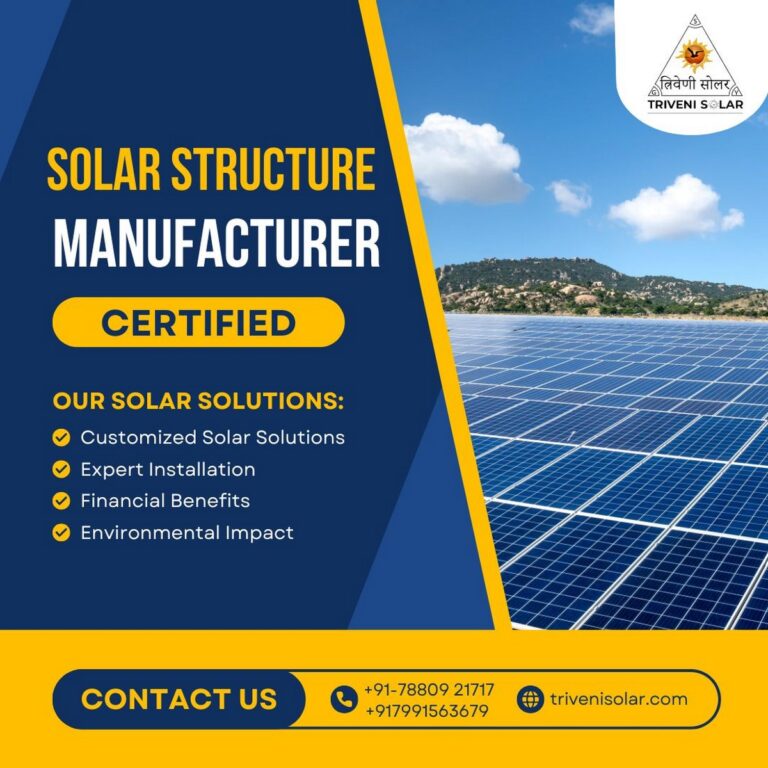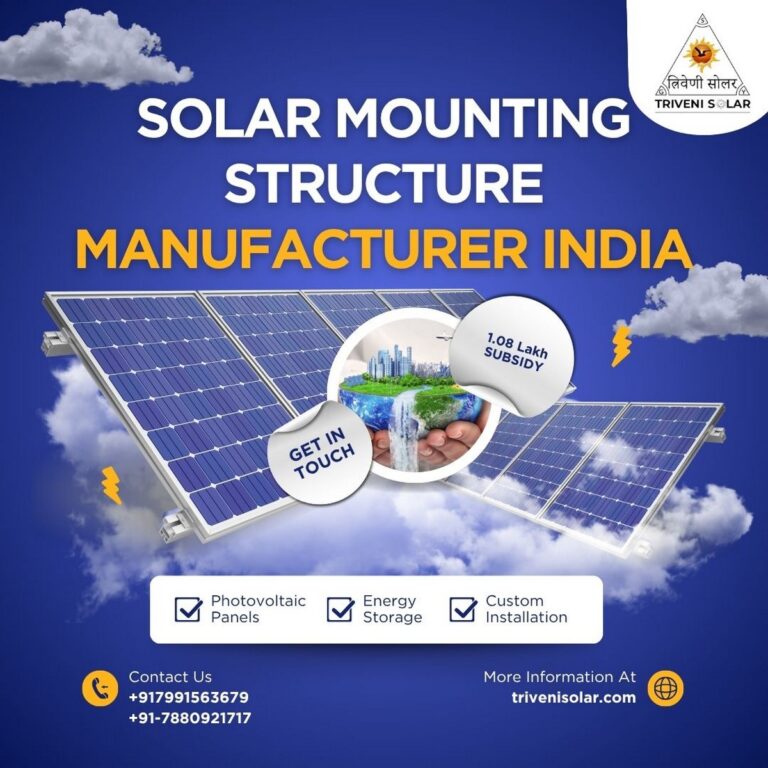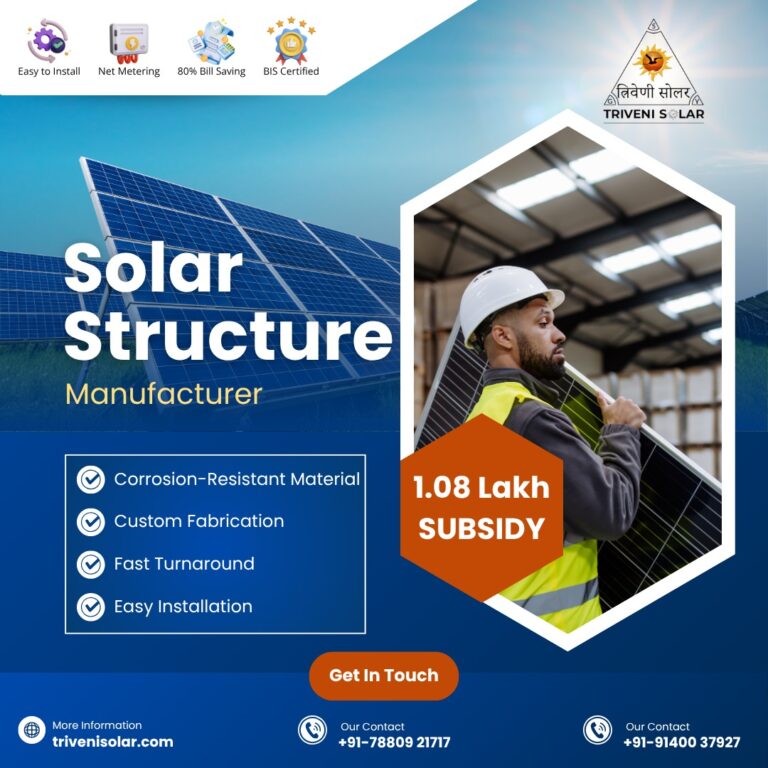To qualify for government solar structure tenders in India, suppliers must have certifications like PWD, BIS, NSIC, and ISO. Registration on the Government eMarketplace (GeM) is mandatory. This guide covers the application process, technical requirements, and tips to win tenders efficiently.
Table of Contents
- Introduction: Why Government Solar Tenders Matter
- Understanding Government Tender Requirements
- Navigating the Tender Application Process
- Triveni Solar: A Trusted Partner in Government Projects
- Industry Trends and Future Outlook
- FAQs on Solar Structure Supplier Government Tenders
- Conclusion & Call to Action
Introduction: Why Government Solar Structure Tenders Matter
The solar energy sector in India is experiencing unprecedented growth, thanks to government initiatives and renewable energy targets. Government solar tenders play a pivotal role in promoting sustainable energy infrastructure while offering lucrative opportunities for suppliers. By participating in these tenders, suppliers can secure large-scale projects, expand their business footprint, and contribute to India’s renewable energy goals.
According to MNRE and SECI reports, India’s solar capacity is expected to surpass 150 GW by 2030, creating a massive demand for high-quality solar mounting structures. Participating in government tenders ensures steady revenue, long-term contracts, and enhanced credibility in the market.
Understanding Government Tender Requirements
Key Certifications for Solar Structure Suppliers
To participate in government solar tenders, suppliers must comply with specific certifications and standards. These include:
- PWD Certification: Ensures adherence to Public Works Department standards.
- BIS Certification: Confirms products meet Bureau of Indian Standards guidelines.
- NSIC Registration: Supports Micro, Small, and Medium Enterprises (MSMEs) to participate in government tenders.
- ISO Certification: Demonstrates quality management and international standard compliance.
- GeM Registration: Mandatory for listing products on the Government eMarketplace, allowing seamless tender participation.
Having these certifications not only makes suppliers eligible for tenders but also builds trust and credibility with government agencies.
Eligibility Criteria for Suppliers
Eligibility criteria may vary depending on tender type, but generally include:
- Minimum annual turnover specified in tender documents.
- Prior experience with similar solar infrastructure projects.
- Documentation: PAN, GST registration, company registration, technical brochures, and proof of past projects.
- Bid security or Earnest Money Deposit (EMD) as per tender requirements.
Suppliers must ensure that all eligibility requirements are met before submitting applications to avoid disqualification.


Solar Structure Tender Categories & Specifications
Government tenders typically include:
- Solar mounting structures for rooftop and ground-mounted projects.
- High-mast solar poles, brackets, and mounting hardware.
- Technical specifications: Material standards (MS steel, galvanization), load-bearing capacity, and corrosion resistance.
- Regional compliance: Some tenders require state-specific approvals or certifications.
Navigating the Tender Application Process
Solar Structure Step-by-Step Application Guide
- Identify Tenders: Use GeM, SECI, PWD portals, and tender aggregator sites.
- Document Preparation: Compile all mandatory documents, technical brochures, and certifications.
- Technical & Financial Bids: Submit separate bids as per tender guidelines.
- EMD/Bid Security: Provide the required financial security to validate participation.
- Submission: Submit applications before deadlines to avoid disqualification.
- Follow-Up: Monitor tender status and respond promptly to queries.
Common Mistakes to Avoid
- Submitting incomplete documents or missing deadlines.
- Non-compliance with technical specifications.
- Incorrect EMD submission or financial errors.
- Failing to provide proof of prior project experience.
Triveni Solar: A Trusted Partner in Government Projects
Our Certifications and Compliance
Triveni Solar is a certified supplier with all necessary credentials to participate in government tenders. Our certifications include:
- PWD-approved solar structures
- BIS-certified materials
- NSIC registration for MSME participation
- ISO-certified quality management systems
- Government eMarketplace (GeM) registration for hassle-free tender applications
Our compliance ensures that all projects are executed to the highest standards, meeting both technical and legal requirements.
Successful Project Case Studies
Here are a few examples of our successful government projects:
| Project | Location | Scope | Outcome |
|---|---|---|---|
| Rooftop Solar for Govt School | Mumbai, Maharashtra | Installation of 250kW solar panels with MS structures | Completed on-time, under budget, fully compliant |
| Ground-Mounted Solar Farm | Jaipur, Rajasthan | 50MW solar farm with high-mast structures | Successful commissioning and performance guarantee achieved |
| Solar Poles for Street Lighting | Lucknow, Uttar Pradesh | Installation of 500 solar poles with mounting brackets | Enhanced energy efficiency and government approval received |
Solar Structure Industry Trends and Future Outlook
Government Policies Shaping Solar Infrastructure
Government policies such as MNRE schemes, GST incentives, and renewable energy targets are shaping the solar tender landscape. Initiatives like the Solar Park Scheme and rooftop subsidy programs provide growth opportunities for suppliers. Understanding these policies helps suppliers anticipate tender opportunities and plan resource allocation.
Technological Advancements in Solar Structure
Innovation in solar structure design is critical. Modern trends include:
- Pre-engineered modular structures for quick installation
- Advanced corrosion-resistant materials for durability
- Lightweight designs that reduce logistics and installation costs
- Integration with smart monitoring systems for performance tracking
FAQs on Solar Structure Supplier Government Tenders
Q1: What certifications are mandatory for government solar tenders?
Suppliers must typically have PWD, BIS, NSIC, ISO certifications, and GeM registration to qualify for government tenders.
Q2: How do I find government solar tenders in India?
Tenders can be found on the Government eMarketplace (GeM), SECI portals, PWD portals, and tender aggregator websites.
Q3: Can new suppliers participate in tenders?
Yes, new suppliers can participate if they meet all eligibility criteria, certifications, and financial requirements outlined in the tender documents.
Q4: What are common mistakes to avoid while applying?
Common mistakes include missing deadlines, submitting incomplete documents, and failing to adhere to technical specifications.
Conclusion & Call to Action
Participating in government solar structure tenders is a strategic way to grow your business and contribute to India’s renewable energy goals. Triveni Solar, with its comprehensive certifications, GeM registration, and proven track record, is your trusted partner for government projects.
Call to Action: Contact Triveni Solar today for consultation on tender applications and explore our certified solar structures for government projects.




